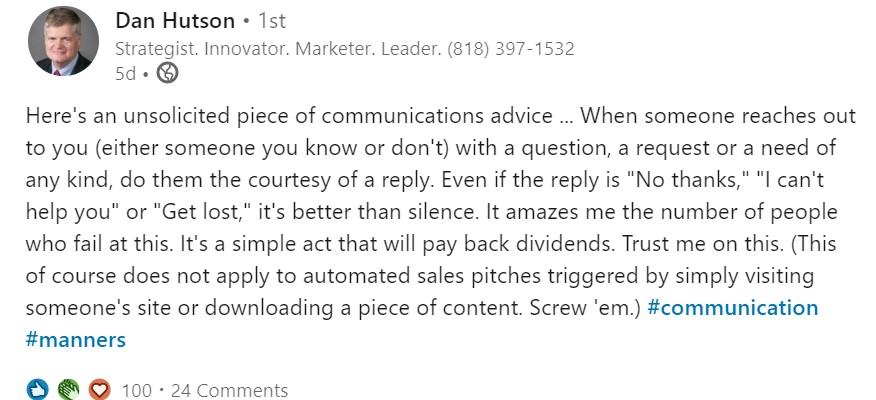By Steve Moran
When I get an idea for an article I will open a new Google Doc, give it a title, and write a sentence or two so I can come back later to finish it up when I have more time or inspiration. This is one that has been sitting in that state of animation for nearly two months. Then, over the last few days, I have been subjected to one of my least favorite jerky behaviors and my friend Dan Hutson posted this on LinkedIn:

Dan’s message inspired me to finish my article.
Five-Minute Favors
Adam Grant talks frequently about doing reasonable five-minute favors. What that means is that if someone makes a reasonable request of you and you can grant that favor in 5 minutes or less, you should do it. A couple of times I have asked him for a five-minute favor and he has granted all but one, which he deemed to be unreasonable (he didn’t say it that way) and when I made the request I knew it might be unreasonable, so I know he walks the talk.
It is probably easier to give a few examples of unreasonable favors:
- Asking for an introduction to someone in a position of power or influence
- Asking for confidential information
- Asking someone to give you for free what they sell
- Making too many small requests
What Happens?
Here is what happens to busy people:
- No one likes to say no because we don’t like people saying no to us. In addition, we are afraid that when we say no people will put more pressure on us or think badly of us, so we ignore those hard conversations by phone or email.
- Sometimes someone will reach out who I really want to connect with but, at that moment, it is not a high enough priority, so I put it off. This, of course, means it becomes out-of-sight, out-of-mind. Sometimes on Sundays, I will plow through old emails and discover one of these.
Even worse. I will be searching for something and discover an old email from months ago I intended to do something about and just forgot. This is where an apology works great. - Sometimes things simply get missed. An email ends up in SPAM or trash, a message gets erased. There are so many ways for things to get missed.
Vendors
In my weird middle world, I am a vendor-to-vendors, meaning my income comes from organizations that want to sell you something. They are always complaining that senior living providers will not call them back. I am not talking about unsolicited requests for conversations, but they will have a meeting or a phone call where the operator says they are open to a conversation and then just never respond.
It is not fair or right. It is better for you and the vendor for everyone to just say, “sorry not interested”. But the irony of it is that while vendors complain about it, they frequently do the same thing to their own vendors and they should know better.
Not Quite Everything
It is always okay to ignore SPAM. It is always okay to ignore bulk email blasts, like the daily Senior Living Foresight email. I would hope everyone would read every day, but it is never going to happen (but don’t ignore us all the time).
It can be hard because sometimes we get emails that look personal but are not. Each week we waste a bit of time with emails offering us “free quality content” in return for a link to their site. These are annoying because they look like real emails until you find out they are offering to write about irrelevant things.
On The Other Hand
Because stuff gets missed or people get busy, before you get mad or discouraged remember that things do get missed. You should be willing to give it a second or third shot. Maybe try a different route, email instead of phone, Linkedin instead of a text. Maybe your email did get lost. Maybe that person is just overwhelmed at the moment. Maybe they are on vacation or have had some sort of family tragedy.
My challenge to you. Spend 30 minutes going through your email box and find a couple of those emails that need a response and respond. You will sleep like a baby tonight knowing you made the world a little bit better place.






I opine here as a CCRC resident. Like it or not, more and more incoming residents will be retirees of a business world that was/is heavily reliant on email and voice mail. Many of us were taught in the corporate world “not to let the sun set on an inquiry or communication from a customer.” One needs to acknowledge receipt of the electronic message, at the very least …. even if the answer or solution or issue couldn’t be resolved quickly. The employees of senior living appear to be oblivious to this courtesy — so many make no acknowledgement of receipt, so the sender wonders if the message got lost in “cyberspace.”
This huge gap in good customer service might be because the staff hasn’t had to deal with residents with email savvy or voice mail savvy up until recently. They don’t realize the frustrations they are causing by having the customer (resident) “hanging out there.” Maybe the recipient has to check with a superior for an answer, but that’s no reason to have the sender wait for days and days.
Jennifer you are so right about this and it hurts business and it is not nice.